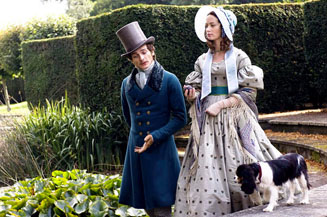He Said: The Young Victoria
By D. James Ruccio III
January 4, 2010
I really dislike movies like The Young Victoria. Not because they're terrible movies but because they're not. It's not a bad movie nor one that's memorable either. Writing about such middling movies is always a challenge. There is nothing distinguishing about it. Ideally, one hopes for something praiseworthy. Barring that, one hopes to incite the villagers with their pitchforks and torches.
As an Anglophile I have a passing familiarity with Queen Victoria. Everyone recognizes the iconic photo of her at her Diamond Jubilee celebrating 60 years of rule over the British Empire. So significant was her Empire's influence over western civilization that the era of her reign was named after her. The British Empire reached its pinnacle and became a extensive world power. But I knew very little of her early life and ascension to the monarchy. So when Caroline suggested we change things up and see something more obscure (we've been in a mainstream rut lately) I was all for the viewing.
The Young Victoria recounts the life of Alexandrina Victoria from age five until the birth of her first child in 1840. As the only legitimate grandchild of George III she became Heiress Presumptive at the age of 11 and thus next in line to the British Throne. As such, she was extremely valuable to those around her. During her childhood she was isolated under the "Kensington System" a restrictive set of regulations established by her mother, Princess Victoria of Saxe-Coburg-Saalfeld, and her mother's adviser, Sir John Conroy, who attempted to limit access of the Royal Court to the child and assure their domination over her. Much of the early portion of the film recounts the struggles of Victoria as both her mother and Sir. John attempt to use Victoria's position, as her 18th birthday approaches, for their own gain. Sir John Conroy is villainously played by Mark Strong, most recently and recognizably as the dastardly Lord Blackwood in Sherlock Holmes.
Others also attempt to enrich their own position by exerting control over the young princess. Politicians all recognize the benefit of securing the young woman's favor, most notably Lord Melbourne played by one of my favorite actors, Paul Bettany.
Meanwhile, the movie also details the attempts by others, near and far, to influence her choice of suitor and eventual husband. The movie focuses, in this regard, on her relationship with Prince Albert of Saxe-Coburg and Gotha, also her first cousin. The pairing was strongly encouraged by King Leopold of Belgium, their mutual uncle.
With such rich material, filled with royal intrigue and personal relationships within the complex system of royal families, there seemed potential for a riveting movie. However, the film never quite explores fully or with sufficient skill all these various aspects. Admittedly, I've never written a historical drama but the fine cast seems to searching the material for something to really do. Paul Bettany's Lord Melbourne is given the most fully realized supporting character in that initially Lord M simply views the young woman as a means to achieve his own political ambitions. His character, however, develops a respect for Victoria's abilities and a fondness for her.
Mark Strong's ability is mostly wasted here as he relegated to simply snarling, frothing and shattering fine crystal like some Victorian Era Neidermayer. His motivation is quite clear, but we're never exposed to what it is he does to achieve his goals other than attempt to control his prized token or then lose his ever loving, exquisitely mutton chopped mind when she invariably refuses to do his bidding.
None of the machinations of the various other powerful people is explored either in much detail, or perhaps more fairly, in a compelling manner. Unlike the standout Elizabeth, Victoria's succession holds little suspense and the film lacks the other movie's sense of other-worldliness and constant danger. It never quite swerves into portraying her as a petulant youth rebelling against oppressive parental figures, but it comes close.
The only place the film truly finds its center is in the relationship between Victoria and Albert. In it we sense the connection between the two as they share the rare common bond of two youths relegated to a lonely existence amidst the most opulent lifestyle imaginable (Kensington Castle, the site of Victoria's childhood, is shown repeatedly through the closing front gate). the relationship starts out awkward with them understanding that this is no simple courtship. Their connection feels real with successes and setbacks as the bond between them strengthens. The end point of their relationship, in the movie, is sweet, sincere and gratifying to the audience.
Unfortunately, what success The Young Victoria finds there it lacks everywhere else. The film is not a failure but merely fails to achieve all the success possible. It's a good film, worth seeing, perhaps, for those interested in the history, but a sense of missed opportunity abounds after the abrupt end.
On another note, do yourself a favor and do see Avatar. I was wary of its "Dances with Blue Aliens" story line and its much hyped revolution in special effects, however, it completely won me over. The story is exactly what you think it is but it's done exceptionally well. And the special effects are truly dazzling. With a running time of two hrs and 40 minutes, it manages to craft a deceptively attractive story which works as an underpinning from which the special effects, which constantly expand ways to explore interesting science-fiction ideas, serve it.




